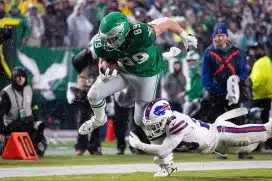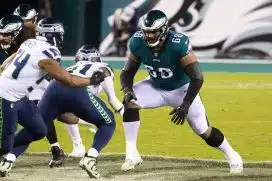By Jesse Larch, Sports Talk Philly staff writer
When the Eagles began OTA's last week, the fanbase was trying to understand the absence of Fletcher Cox from the first installment of voluntary workouts.
It turns out that Cox was attending a family function during the first set of OTA's, and he has returned for round two of voluntary workouts.
Missing from both sets of workouts so far are defensive end Marcus Smith, punter Donnie Jones, and starting left tackle Jason Peters.
The absences of Peters and Jones drew essentially no criticism from the media, while Smith and Cox have not been given a pass.
Voluntary workouts are treated as voluntary unless you have an emergency of prior engagement, and not truly voluntary although the rule allows it. No team can punish a player for staying home just because they want to, but teams certainly seem less willing to forgive that reason over illness or another more excusable reason.
As it turns out with voluntary workouts, there is a bit of a double standard. One where the younger players are expected to attend while seasoned veterans are not.
Fletcher Cox's absence dominated headlines during round one of OTA's, while Jason Peters's absence hardy caught any attention. The difference is in the players' age. In Cox and Peters, you are talking about all-pro caliber players who get paid big money to be key players for the team, yet head coach Doug Pederson only discussed Fletcher Cox's absence and not Jason Peters'.
Pederson mentioned that Cox is seen as a team leader and he expects his leaders to be here, but he did not offer the same criticism to Jason Peters, who has been a leader for the Eagles significantly longer than Cox has.
Cox is questioned because of his perceived regression last season, despite making the Pro Bowl for the second time last season. He is also questioned because of his big contract that clearly makes him a core player for the team going forward.
Peters also occupies a good chunk of cap space, has regressed over the past few seasons — while still being an above average player — and is relied on to be a key part of the offense. So why does he not get the criticism that Cox does?
Again, it comes down to age. Peters, 35, does not get questioned and is seen as more beneficial for his health. For Cox, 26, time off is seen as lazy or irresponsible.
Peters has been nagged by injuries over the past couple of seasons, especially during the high-rep Chip Kelly era. It is understood that older players, like Peters, should not go through the same wear and tear as the younger players like Cox.
By Peters not taking part in OTA's, he is keeping himself fresh for the grueling 16-game season instead of putting more miles on his body in OTA's. For Cox, the miles are irrelevant because his career is still blossoming while Peters's is at the end of its road.
It is a similar criticism with Donnie Jones and Marcus Smith. Part of the acceptance for Jones is that he plays a less important position as a punter, but it is also that he too is a player towards the end of his career and needs rest over reps.
Smith is in the opposite position, being a former first-round pick that has not met expectations and is expected to battle for a roster spot. Smith's absence is mind boggling, considering that he is not guaranteed a roster spot and he should be shedding the disappointment label instead of contributing to it.
The word is Smith's absence is that he simply is exercising his option to not attend the practices.
For young players, they are expected to continue to refine their skills and fundamentals before the pads go on, while the older veterans are allowed to stay at home to keep their bodies free of bumps and bruises during the light work so that they are 100 percent when mini camp and training camp begins.
Marcus Smith and Fletcher Cox are not breaking any rules, and neither are Donnie Jones or Jason Peters, however Smith and Cox violated a code while Jones and Peters abided by it while they all did the same thing.
A double standard indeed.







